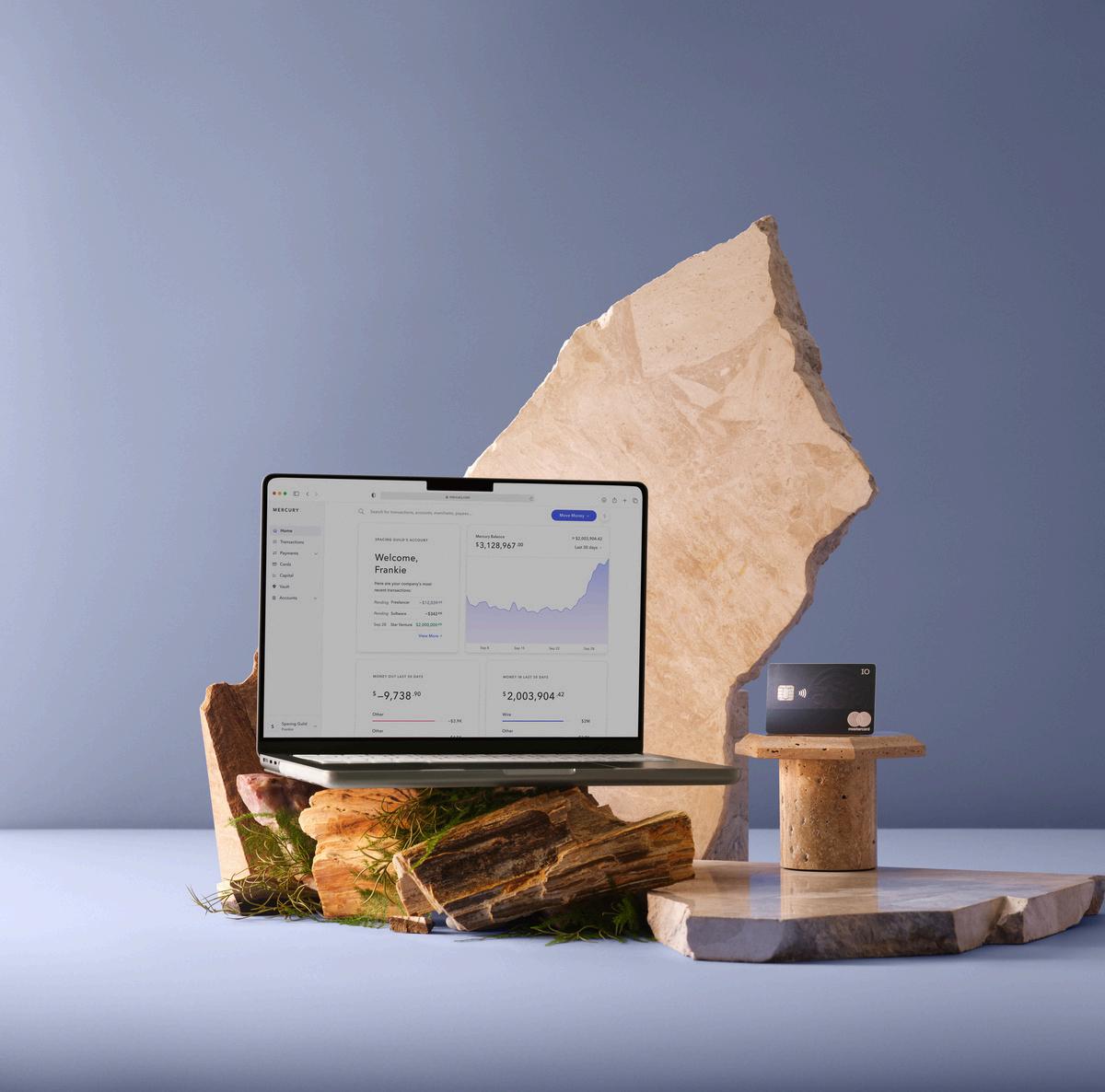AI, ENERGY & DEFENSE
THE FRONTIER OF STRATEGIC CAPITAL

BY SHELLEY GOLAN
SENIOR DIRECTOR AT MERCURY



BY SHELLEY GOLAN
SENIOR DIRECTOR AT MERCURY

By Shelley Golan, Senior Director at Mercury
We are entering a new industrial era one shaped not by coal or oil, but by compute, energy resilience, and geopolitical urgency. New technologies and global realities demand a capital landscape shift. AI isn’t just about software. Defense isn’t just about missiles. Energy isn’t just about ESG. They are now interconnected levers of geopolitical and economic power.
For family offices and long-term capital allocators, this isn’t just another tech cycle. It’s a realignment of the entire capital stack that will dictate the direction of the future for the next 100 years.
At Mercury, we bank more than 200,000 ambitious companies well as thousands of VC entities – many of which are shaping this new industrial wave. Why do so many next-gen technology companies and VCs trust us for banking*? Because we build for their pace, their complexity, and their ambition. What we’re seeing from the inside is a convergence of trends that will define the next decade of investing. Our partners in private capital look at us not just as a fast-growing Fintech, but as a valuable partner for their deal flow.

These three sectors – once siloed – are now fusing into a single investment thesis. AI models are powering defense platforms. Defense priorities are influencing energy policy. Energy infrastructure is becoming the foundation for computational sovereignty.
Sectors such as Agtech, ClimateTech, Aerospace and Deeptech are integrated and bundled under the banner of what Andreessen Horowitz has dubbed “American Dynamism.
There’s a sharp increase in companies that don’t neatly fit into categories – because they’re inventing new ones. A climate startup building nuclear energy storage. An AI chipmaker working with grid operators. A defense drone company integrating renewable charging systems.
This isn’t a trend It’s a transformation And the capital structures we use to fund it – rigid venture funds, narrow mandates – aren’t built for this moment. What’s needed is a flexible approach: direct ownership, hybrid equity, patient capital.

Barely two and a half years since OpenAI released ChatGPT to the public, the numbers are hard to ignore: According to private Pitchbook data, over 100 billion was invested in generative AI in 2024, and almost as much invested halfway through 2025. Seed-stage AI startups regularly raise $50M+, with bigger Series A rounds that look like latestage growth deals following closely.
While the thawing of the “VC Winter” of 2022-2023 is most welcome to players in the venture ecosystem, the question remains: is the disproportionate investment in nascent AI companies actually addressing the needs of an AI powered future, or are we missing the bigger picture?
The answer is both. There will be immense value destruction – and a handful of outliers that define new global infrastructure. AI is a cross-cutting technology with implications for defense, energy, healthcare, and more. Without equivalent investment in these areas, as well as in the data infrastructure and energy sources needed for an AI integrated future, we run the risk of tying up capital in thin wrappers; slick demos built atop open-source models, buoyed by hype but vulnerable to commoditization.

There’s a peculiar tension in defense tech right now. On one hand, startups are securing massive government grants, SBIR contracts, and pilot deals. On the other hand, many can’t secure a simple working capital line.
Why? Because grants don’t guarantee liquidity. One of the core challenges with defense contracting – especially for startups – is that the government awards most contracts on a milestone basis. The actual kickoff payment is tied to hitting the first milestone, which could be 4-6 months away. Defense founders who do not take care to frontload their contracts may find themselves in the unenviable position of holding lucrative government grants but unable to get a traditional lender to cover operational expenses before their first milestone payment hits.
This valley of financing is even more unfortunate when considered against the shifting of the defense contracting landscape by the current administration Historically, primes like Lockheed Martin and Raytheon have dominated defense contracts. However, there is an intentional push by DoD to widen the playing field to "non-traditional primes" like Anduril and SpaceX, with an even newer generation of primes like CHAOS Industries and Saronic at bat. These firms operate more like startups than legacy defense contractors, and they’re reshaping how the government evaluates risk, speed, and capability.
This is where private capital can step in and own the upside. For family offices willing to lean in, there’s an opportunity to fund the operational backbone of defense innovation before institutional capital catches on – or the space will continue to see otherwise solvent, high-potential defense companies struggle simply due to contract timing misalignments.
We are accustomed to ClimateTech encompassing things like ESG, solar panels and sustainability decks. But that narrative is expanding and evolving. Nuclear is back in the conversation. Grid-scale battery storage, Hydrogen, geothermal, and microgrid startups are getting calls from both Silicon Valley and D.C.
Energy is no longer just a climate story – it’s a sovereignty story, an AI enabler, and a defense priority.
As AI infrastructure scales – think GPU farms, data centers, edge compute – energy demand is exploding far beyond our existing capability to meet it, and even farther beyond our ability to power it using renewable clean energy sources. Today this topic is even more relevant, as geopolitical volatility increases and grid capabilities worldwide falter.
According to Pitchbook data, ClimateTech investing has dropped more than 55% in 2024 compared to its 2021 peak In contrast, clean energy investments have remained relatively stable through 2024 and into 2025. However, the pressures of tariffs on existing solar and wind supply chains, combined with regulatory red tape around permitting essential data infrastructure, are challenges that have yet to find a clear solution. This friction risks discouraging both founders from entering the space and capital providers from funding it at the scale required.
Emerging fund managers focusing on climate are particularly hard hit by this shift, and many are struggling to close their funds. They are doing the work of recalibrating their thesis and positioning to align with the Climate x Energy x AI x Defense paradigm that is leading the charge in the investment ecosystem today. Despite the challenges, this space is uniquely suited for family office investment; bringing together the new-generation’s enthusiasm for cutting edge technologies and an investment strategy accustomed to long horizons with massive, cross-vertical upside.
As the financial partner to 1 in 3 startups** and 50% of Y Combinator cohorts, Mercury has a unique vantage point to the founders of tomorrow. They’re building – quietly, ambitiously, and often far ahead of the curve.
Family offices and HNWIs that recognize this convergence – and allocate accordingly – will shape the next generation of industrial wealth
The question isn’t what company will be the next OpenAI. The question is: when the dust settles, which companies will have built the roads, bridges, and power lines of the next economy?
About The Author:
Shelley Golan is a bi-coastal serial founder, startup advisor, and ecosystem builder with expertise in FinTech, ClimateTech, and DeepTech. She is Senior Director of Relationship Management at Mercury, overseeing a portfolio of venture-backed startups. Shelley is also the founder of Potomac Growth, an equity crowdfunding marketing company
Email: shelley@mercury.com
*Mercury is a financial technology company, not a bank. Banking services provided through Choice Financial Group, Column N.A., and Evolve Bank & Trust; Members FDIC. The IO Card is issued by Patriot Bank, Member FDIC, pursuant to a license from Mastercard®.
**Calculation based on US-based companies that received an angel, pre-seed, seed, or Series A investment reported on Crunchbase in the most recent year.)




